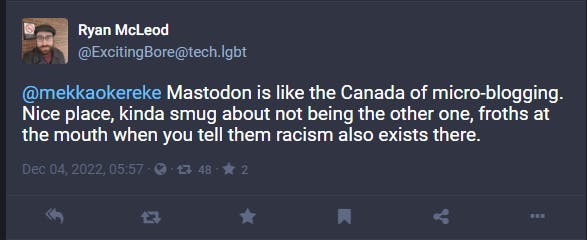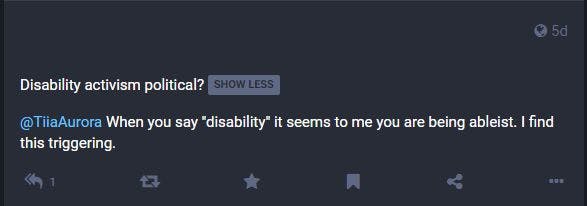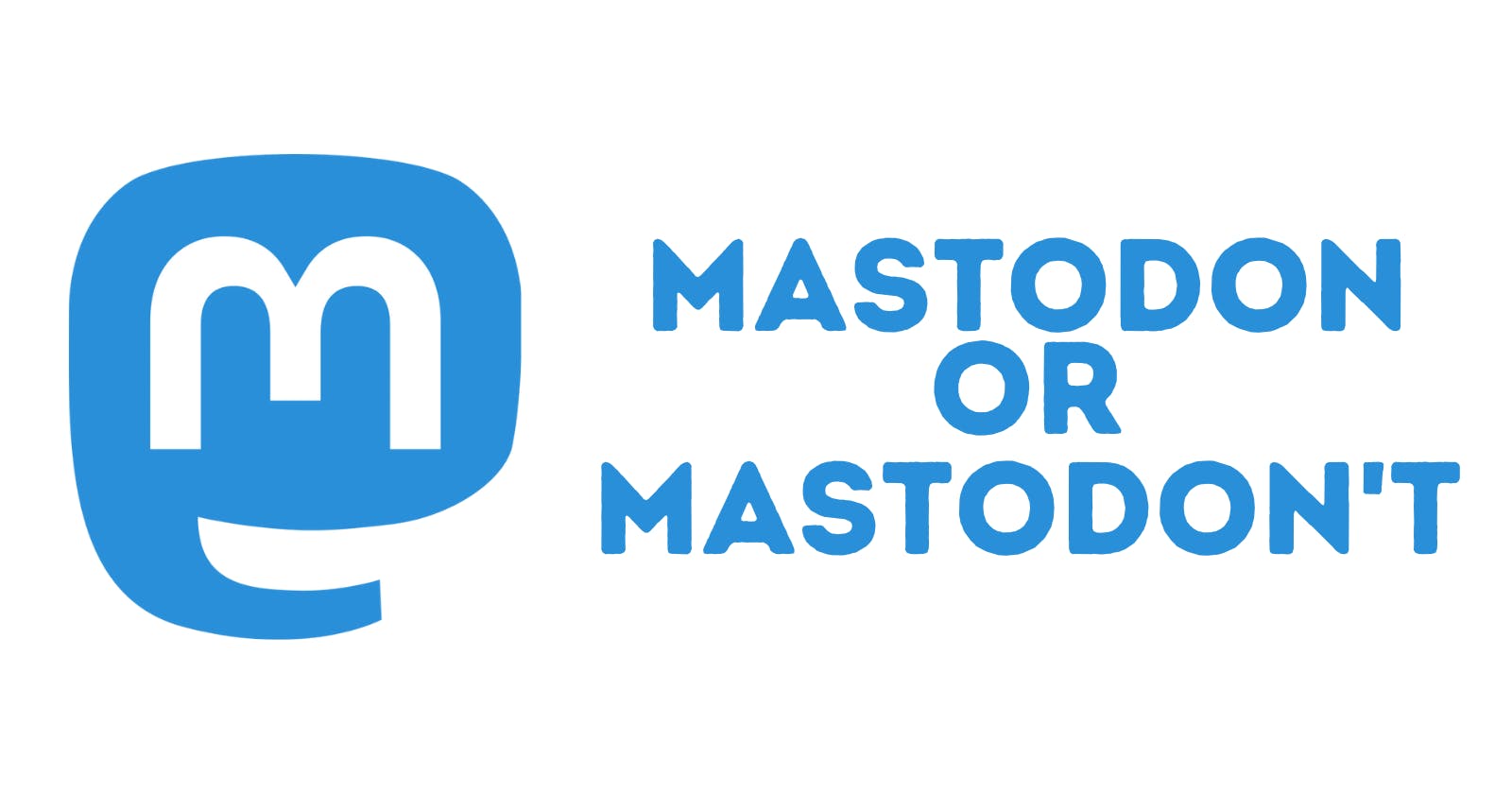I have been thinking about writing something down for a long time and didn't do it because I had so many thoughts about it and felt like I lacked a structure to this article but with the recent discussion about content moderation and what is appropriate to post and what isn't, I believe we need to address a few issues.
(I am using Mastodon and the Fediverse interchangeably here.)
Before I go any further, I want to emphasise that whatever I'm implying now is still better than what's going on on Twitter right now. So don't think of this as a "Which is better, Twitter or Mastodon" debate, because Twitter under Elon Musk will always lose this debate.
How does Mastodon Work?
Mastodon is a decentralized social networking platform that consists of many independent "instances" that are run by different organizations or individuals. These instances are interconnected and can share content with each other, allowing users from different instances to interact with one another.
To connect to other instances, Mastodon uses the ActivityPub protocol, which is an open federated protocol for social communication. This allows users from one instance to follow and interact with users from other instances, as well as share and view content from other instances.
The Culture of Mastodon before 2022
Many people would say Mastodon does not have a particular culture because every instance decides what culture they want to cherish, but considering that those instances connect to each other and have to somehow get along with each other, there has to be some common ground that instances that want to stay connected have to agree on (within country law boundaries).
To understand what happened to Mastodon this year, it's important to see what happened to their tight-knotted community during only 2022.
Mastodon in 2022
Mastodon has been a fairly small community with around 244k in 2021, growing by around 800 over the whole year.
With Twitter announcing Elon Musk might be buying it and him actually buying it, all hell broke loose. While in April 2022 around 90k active users joined the discussions in the Fediverse, by the end of November there were almost 4 million active users on Mastodon, 6 million accounts and almost 10k instances.
As someone who joined Mastodon just with the "Musk may buy Twitter" announcement, I was part of the "first wave" of exiled Twitter users joining the Fediverse.
The Demographics
While I don't have official numbers, I have eyes. Mastodon is white, male and at least in their 40s. Conversations feel like a mixture of guys in bars talking and your family WhatsApp group which mainly contains of brothers and uncles. There are women, of course, and there are people of color too, but it's, unfortunately, an exception.
How It Was to Join Mastodon With a Social Media Background
I was connecting to a lot of long-time users there, to build connections and sense the "vibe" of the community to know what I can do or say there and what not. Mastodon has a reputation to be open and welcoming to new people. Many say once they joined they would never go back to Twitter again because they felt like they finally escaped the hostility that Twitter was to some.
Hostility Towards New Users
That was not my experience. I felt a lot of hostility from Mastodon users toward Twitter users who would join, despite the fact that many of those older users were on Twitter at the same time as well.
Twitter users were generally viewed as "attention-seeking", "dopamine-addicts", "hostile," and I've read a lot of war-rhetoric implying that Twitter users storm and capture their platform and "home." The hostility got only worse mid-November.
I'm pretty good at staying in places where I don't feel welcome just to prove those people wrong and show them that I can be of value, but many people don't. And, to be honest, I don't blame them. It takes a lot of mental energy not only to overcome the loss of a community to which you felt you belonged for years but also to find a new group for yourself. Especially when you usually don't feel like fitting in.
I am now in a place where I get fewer hateful messages and replies but only because I don't collect them uncommented. I will tell people when they are inappropriate. And that also takes a lot of mental energy.
Racism
There is no way we can't talk about racism here. There is racism on Mastodon and it is one of the things people on Mastodon really don't like talking about. And also don't like to see being talked about. I mentioned the demographics earlier and that mixture of male/white privilege and ignorance towards topics that don't involve them is showing in suggestions like hiding racism topics behind trigger warnings, so people don't get traumatized. While the argument is to protect people experiencing racism with that decision, a better approach would be.. I don't know. maybe not being racist. Hiding the experience people make instead of fighting against the root of it seems wrong.

Ableism
The points you see for racism are repeating themselves also for disabilities. Disability topics are sometimes asked to be hidden behind trigger warnings or people suggest to disabled people to leave a non-disability-exclusive space to rather join an instance that is for disabled people only. Talking about disability topics can cause reactions like this one here:

For the sake of not giving this person more of a platform than Mastodon already does, I removed the identifiers to this message. Making jokes about tough situations can be a coping mechanism. This is straight just harassment, especially because my initial message did not give any room for jokes of this kind.
Telling people they have to hide for who and how they are is straight-up discrimination. Sure it might be irritating to someone who avoided disabled people their whole life to find them "out in the public" but that's where disabled people belong. They deserve to be in the same space as abled people. No discussion.
Sexism
And while we are at it, let's also look at the third of the -ism that you will experience. The sexism you will experience is not the blatant "I hate women" kind of sexism that you see on Twitter so often. It's the more subtle one. The one where a man will jump in and explain things to you, despite you never asking for an explanation.
The "maybe a man can help you do this technical thing" comments. The overall assumption is that women can't know anything without a man explaining it to them DESPITE the woman already showing proof that they have an in-depth knowledge of things.
Then jokes you would probably book in as "Boomer Humor" aka. I hate my wife and marriage is a prison kind of jokes. Something very popular in the older generation but most likely not common for anyone younger than let's say 35.
Reacting to Criticism
There are two main points brought up to people pointing out these flaws in the Mastodon culture:
You have no say here, you are a Twitter user. "Either take it or leave. We didn't want you in the first place" combined with pointing out registration dates.
Make your own instance if you don't like it.
Neither of those is a solution.
To 1: Mastodon users are big in pointing out that the user is the main focus of Mastodon. Not being the product anymore but having a voice to be heard. Not being silenced anymore. This behaviour is the opposite to what is preached. Sure it has its limits when it comes to breaking the law or supporting hate speech against people, stalking etc... But pointing out harmful behaviour should never be limited or silenced.
To 2: Making your own instance has several downsides: It requires money, technical knowledge and resources. Telling a minority they only have a voice if they pay for it, is coming from a place of privilege on itself.
I am aware that Mastodon itself is not free. We have to rely on other people paying for it while being able to support them with donations. But using this to silence voices because you can assume they will not be able to make their own instance, hoping they just disappear is straight evil.
An own instance is not automatically as connected to other instances as a bigger established instance is. So you would also remove their reach. Doing this with minorities is problematic at best.
Locking disabled people and people who are not white males onto their own instances just makes it easier to remove their voices from your view by defederating their instance. That is a risk for minorities.
Last but not least. Mastodon has a scaling issue. The more instances are added, the worse it gets. There is a great article by Aral Balkan where he explains that Mastodon can't scale to accounts with many followings on many instances.
There Are Also Good Things
While avoiding all these things I mentioned above is a walk on eggshells, I found many new people worth connecting with and having conversations with. The people that ARE nice I would really miss if I considered leaving Mastodon.
Because of the different text length limits, there is a lot more text-based conversation happening which at times I enjoy.
When you are on a good instance that is run by people who take those concerns seriously, you can have a really good time.
You don't have to fear Elon Musk buys this any time soon or even joins.
Conclusion and Why This Article
This article is not to trash people. Quite the opposite. I see what a great space Mastodon could be with more inclusiveness and acceptance. Do I have a solution for it? I wish I had. Changing a years-long developed culture is nothing that can be fixed with a few rules, but I have a few suggestions:
Include more diverse people in the decision-making. There is nothing bad about not being able to understand people's struggles because it does not affect you, but making sure to give those people a voice and involve them.
If you have no knowledge about a specific topic when making rules for a community, ask experts. Silencing or limiting the voice of victims of racism and ableism experiences is highly problematic.
When using polls for decisions, keep in mind that the group you are asking to vote can potentially be very biased and vote against what would be good for the community vs. their personal gain. Especially when your community is small and has only little heterogeneity
There will be a potential for the exclusion of marginalized individuals or groups from the decision-making process, because they are in the minority.
The best would be a global ruleset which instances can use as a guideline, but that one needs to be open for discussion or criticism in case problematic decisions are made.
I really want Mastodon to be a good alternative to any other micro-blogging-service. I want it to thrive, but you need to open the doors for people that may not look like you and you need to protect the voices of marginalized individuals at all costs because otherwise it is not a safe place for us to stay and nothing else than a white, abled bodies echo chamber.

